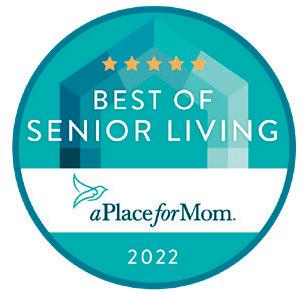
6 minute read
FO R Y O U R C LI EN T S
Compassionate and Highly Trained Nursing Staf f Available 24/7
Exclusive MONTESSORI MOMENTS IN TIME ™ Memor y Care program
Rapid Response Program for Admit ting New, Qualified Residents
On-Site Rehabilitation and Physical Therapy

Transpor tation Available for Doctor Appointments and Weekly Outings
Shor t-Term Respite Stays Available for up to 60 days
Beautiful, Amenit y-Rich Communit y Thoughtfully Designed for Great Living


Exceptional Dining Program Presented by Executive Chef
Daily Social Calendar Focused on Wellness, Friendship and Fun
High Resident and Family Satisfaction Ratings
(239) 236-8893
1321 NE 24th Avenue · Cape Coral, Florida 339 09 www.atriumatliber t ypark .com




Follow Us on Facebook @AtriumatLiber t yPark
§482.43 Conditions of participation: Discharge planning.
The hospital must have an effective discharge planning process that focuses on the patient’s goals and treatment preferences and includes the patient and his or her caregivers/support person(s) as active partners in the discharge planning for post-discharge care. The discharge planning process and the discharge plan must be consistent with the patient’s goals for care and his or her treatment preferences, ensure an effective transition of the patient from hospital to post-discharge care, and reduce the factors leading to preventable hospital readmissions.
(a) Standard: Discharge planning process. The hospital’s discharge planning process must identify, at an early stage of hospitalization, those patients who are likely to suffer adverse health consequences upon discharge in the absence of adequate discharge planning and must provide a discharge planning evaluation for those patients so identified as well as for other patients upon the request of the patient, patient’s representative, or patient’s physician.
(1) Any discharge planning evaluation must be made on a timely basis to ensure that appropriate arrangements for post-hospital care will be made before discharge and to avoid unnecessary delays in discharge.
(2) A discharge planning evaluation must include an evaluation of a patient’s likely need for appropriate post-hospital services, including, but not limited to, hospice care services, post-hospital extended care services, home health services, and non-health care services and community based care providers, and must also include a determination of the availability of the appropriate services as well as of the patient’s access to those services.
(3) The discharge planning evaluation must be included in the patient’s medical record for use in establishing an appropriate discharge plan and the results of the evaluation must be discussed with the patient (or the patient’s representative).
(4) Upon the request of a patient’s physician, the hospital must arrange for the development and initial implementation of a discharge plan for the patient.
(5) Any discharge planning evaluation or discharge plan required under this paragraph must be developed by, or under the supervision of, a registered nurse, social worker, or other appropriately qualified personnel.
(6) The hospital’s discharge planning process must require regular re-evaluation of the patient’s condition to identify changes that require modification of the discharge plan. The discharge plan must be updated, as needed, to reflect these changes.
(7) The hospital must assess its discharge planning process on a regular basis. The assessment must include ongoing, periodic review of a representative sample of discharge plans, including those patients who were readmitted within 30 days of a previous admission, to ensure that the plans are responsive to patient post-discharge needs.
(8) The hospital must assist patients, their families, or the patient’s representative in selecting a post-acute care provider by using and sharing data that includes, but is not limited to, HHA, SNF, IRF, or LTCH data on quality measures and data on resource use measures.

The hospital must ensure that the post-acute care data on quality measures and data on resource use measures is relevant and applicable to the patient’s goals of care and treatment preferences.
(b) Standard: Discharge of the patient and provision and transmission of the patient’s necessary medical information. The hospital must discharge the patient, and also transfer or refer the patient where applicable, along with all necessary medical information pertaining to the patient’s current course of illness and treatment, post-discharge goals of care, and treatment preferences, at the time of discharge, to the appropriate post-acute care service providers and suppliers, facilities, agencies, and other outpatient service providers and practitioners responsible for the patient’s follow-up or ancillary care.
(c) Standard: Requirements related to post-acute care services. For those patients discharged home and referred for HHA services, or for those patients transferred to a SNF for post-hospital extended care services, or transferred to an IRF or LTCH for specialized hospital services, the following requirements apply, in addition to those set out at paragraphs (a) and (b) of this section:
(1) The hospital must include in the discharge plan a list of HHAs, SNFs, IRFs, or LTCHs that are available to the patient, that are participating in the Medicare program, and that serve the geographic area (as defined by the HHA) in which the patient resides, or in the case of a SNF, IRF, or LTCH, in the geographic area requested by the patient. HHAs must request to be listed by the hospital as available.
(i) This list must only be presented to patients for whom home health care post-hospital extended care services, SNF, IRF, or LTCH services are indicated and appropriate as determined by the discharge planning evaluation.

(ii) For patients enrolled in managed care organizations, the hospital must make the patient aware of the need to verify with their managed care organization which practitioners, providers or certified suppliers are in the managed care organization’s network. If the hospital has information on which practitioners, providers or certified supplies are in the network of the patient’s managed care organization, it must share this with the patient or the patient’s representative.
(iii) The hospital must document in the patient’s medical record that the list was presented to the patient or to the patient’s representative.
(2) The hospital, as part of the discharge planning process, must inform the patient or the patient’s representative of their freedom to choose among participating Medicare providers and suppliers of post-discharge services and must, when possible, respect the patient’s or the patient’s representative’s goals of care and treatment preferences, as well as other preferences they express. The hospital must not specify or otherwise limit the qualified providers or suppliers that are available to the patient.
(3) The discharge plan must identify any HHA or SNF to which the patient is referred in which the hospital has a disclosable financial interest, as specified by the Secretary, and any HHA or SNF that has a disclosable financial interest in a hospital under Medicare. Financial interests that are disclosable under Medicare are determined in accordance with the provisions of part 420, subpart C, of this chapter.
[84 FR 51882, Sept. 30, 2019]
Note: Website to obtain quality measures and data on resource use for LTCH. https://www.medicare.gov/longtermcarehospitalcompare/
The Grids at a Glance notebook is here to make your life a little easier. This referral notebook has been created especially for any professional looking to make a connection for their patient or client when they need services such as home care, home health, or senior housing. In this guide, you will see that we have listed e-mails, phone numbers, and fax numbers in addition to our existing grid information for ease of use and accessibility.
The Grids at a Glance and Seniors Blue Book provide the most accurate, comprehensive information available on these options and are meant to work in conjunction with one another. The Seniors Blue Book is for your clients and this referral guide is for the busy professional - not to be handed out to clients. Please log on to SeniorsBlueBook.com and become a member to access the Grids at a Glance online. From there you can access digital hyperlinks, print specific pages as you need them, and find timely information on events for senior care professionals.
Please continue to utilize as many Seniors Blue Books as needed. The handy pocket size directory is treasured by seniors and their caregivers. Give them out liberally and let us know when you need more. Call 239-776-7353 or email me at Abarton@SeniorsBlueBook.com and
I’ll be happy to replenish your supply. Thank you for all that you do for our seniors. Please let me know if you have suggestions on how we might make Seniors Blue Book and the Grids at a Glance even more useful to you and your team.
Amanda Barton, Publisher

813-731-6069

ABarton@SeniorsBlueBook.com





Rebekah Benson, Business Manager Rebekah@SeniorsBlueBook.com



Sandra Jensen, Chief Operations Officer

Sandra@SeniorsBlueBook.com
Samantha Hersch, Owner Samantha@SeniorsBlueBook.com

Copies of Seniors Blue Book for your clients can be found FREE at most pharmacies and gathering places for seniors and can be requested calling 239-776-7353. The contents of this book may not be reproduced either in whole or in part without consent of the publisher. Every effort has been made to include accurate data, however, the publisher cannot be held liable for material content or errors.
Copyright 2023 by Samantha Hersch Enterprises dba Seniors Blue Book.
Kerri Johnson, RN, CDP, EMBA Founder and CEO (904)395-7500

www.gomotravel.com
Kerri@gomotravel.com


